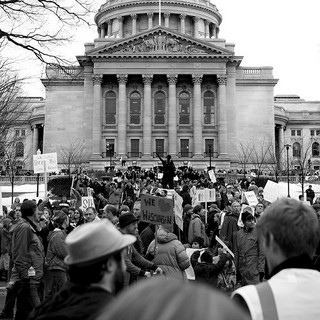It’s membership time. Cultivate Canada’s media. Support rabble.ca. Become a member.
The re-election of Governor Walker June 5 in Wisconsin represents the worst defeat for American labour since former U.S. president Ronald Reagan busted the air traffic controllers union in 1981. Walker won re-election June 5, after being “re-called” from office by citizens angry about his anti-labour legislation.
On February 11, 2011, Walker introduced a bill that ended automatic dues collection, and restricted collective bargaining to wages which were capped at no more than the standard of living. Rights to negotiate work standards, pensions, health and other benefits were withdrawn by what was called the “budget repair bill.”
Opposition was immediate. An alliance between labour and the progressive community resulted in a successful re-call campaign which gathered 900,000 signatures. As many as 100,000 demonstrators hit the streets in efforts to force Walker to face re-election in what, for labour, amounted to a referendum on collective bargaining rights in the public service.
There were good reasons to defeat Walker. As Paul Krugman has documented, budget cutters in state capitals are one of the reasons the U.S. economy continues to stagnate with no end in sight. The Walker victory can only encourage exponents of Ronald Reagan economics (Reaganomics), which means spreading further economic misery across the entire U.S. The Walker win emboldens conservatives such as Republican nominee for president Mitt Romney, but also the Tea Party activists who won big in the last U.S. mid-term elections.
There were historical reasons to think Walker would be defeated. In 1979, Wisconsin became the first state to bargain collectively with its employees. Indeed, Wisconsin is considered the homeland of the progressive movement in the U.S. The state sent the legendary Senator Robert “Fighting Bob” La Follette to Washington. Both the capital Madison, and the University of Wisconsin have strong liberal and progressive credentials. The way Walker won re-election is bad news for Democrats in an election year, starting with President Obama, as he begins his re-election campaign. A select circle of Republican right-wing billionaires poured money into the campaign, outspending the Democrats three to one. Saturation television ads sent out the Reaganite message: tax cuts are good, public spending is bad.
The cautionary tale from Wisconsin is that bad times do not result in throwing away ideas that have not worked for the last 30 years. Instead, the dominant political forces coalesce, and work harder to maintain their control of the political agenda. American labour leaders who thought they could leave opposition to the Walker agenda to his Democratic political adversary were proven wrong. About 38 per cent of labour voters backed Walker, the anti-labour governor.
Politics as usual did not work for American progressives in Wisconsin. Agreed, the Democratic candidate for governor could have been stronger. Yes, democratic debate was stifled by anti-labour, pro-governor media buys. But relying on the competitive party system, and the mainstream media in a battle against corporate dominance of political life is not going to work, and not just in Wisconsin.
Labour does not have great influence within the Democratic party, which has been better at taking labour donations than it has been in adopting pro-labour policies. President Obama did not campaign with labour leaders against Governor Walker. Neither the American labour movement nor the Democratic party take political education seriously.
People looking for resources to promote progressive change in the U.S. can find them. Marshall Ganz, a champion of union-style local organizing advised the successful Obama presidential campaign. The Economic Policy Institute provides activists with economic education, and research on living standards. A vigorous alternative media provide progressive Americans with new tools and identifies mobilization opportunities.
Grassroots political organizing is what progressive politics is supposed to be about. The defeat in Wisconsin hurts so badly because it demonstrates the organizing weakness of American labour, and the American progressive movement in general.
The balance of political forces may be stacked up against progressives, but that does not explain the weakness of progressive forces. The hold of the dominant ideology of corporate America over popular consciousness can be overstated. More and better leadership would help promote a progressive vision and agenda.
Labour lost in Wisconsin because it did not mobilize its base. Progressives failed to energize enough people to make a difference. The commitment to change did not become broader enough to get sufficient numbers of people to act on behalf of a common goal.
In Wisconsin the right captured the popular imagination by re-running the discredited nostrums of Reaganomics. It was enough to demonize democratic public spending, and assure the re-election of Walker. The best way to inoculate the public against bad ideas and weak thinking is to organize. By failing to marshal its arguments, and mobilize people, American labour got beaten at what should be its own game.
Duncan Cameron is the president of rabble.ca and writes a weekly column on politics and current affairs.



